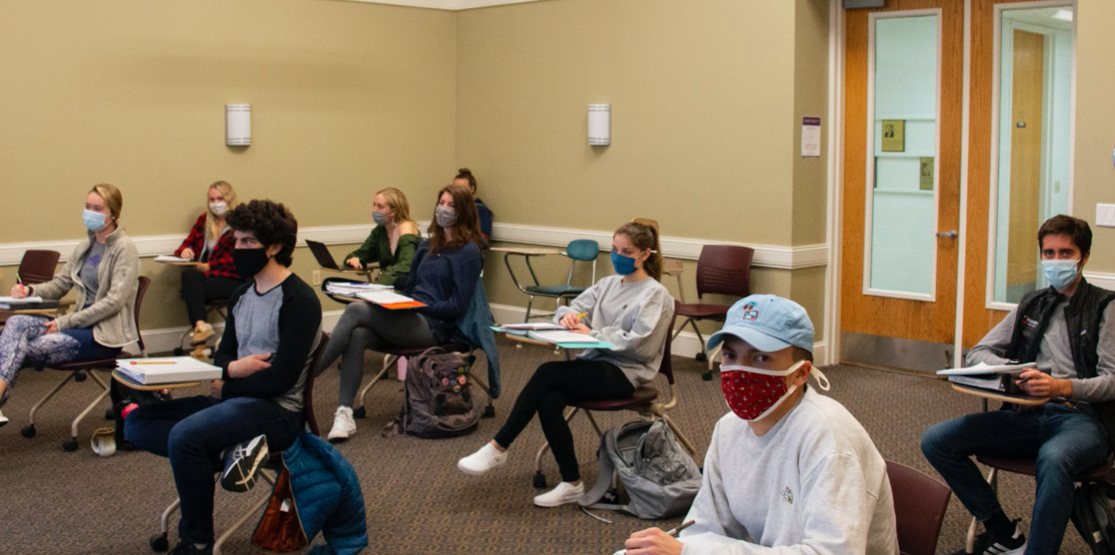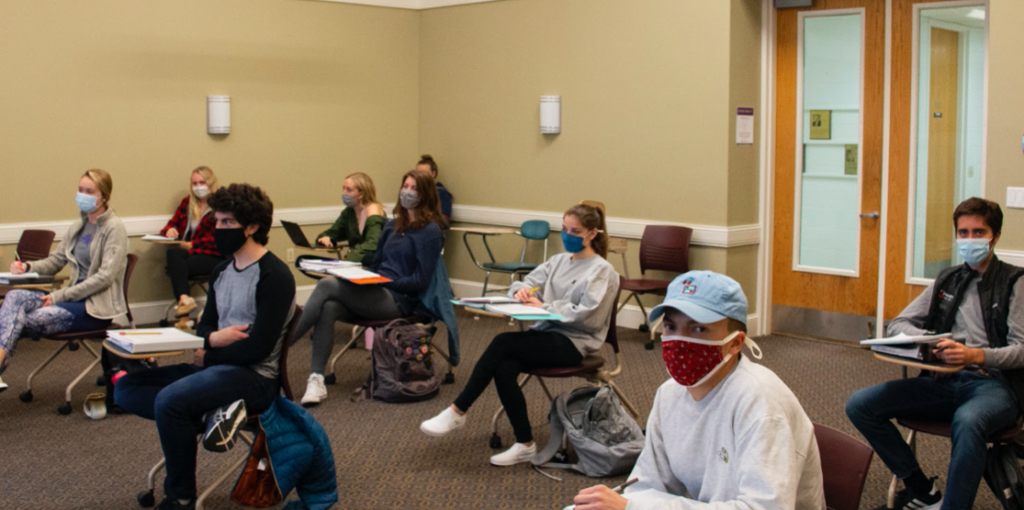
By Sarah Knickerbocker
Design Editor
As students prepare for their fourth round of COVID-19 testing, Saint Michael’s College employees, including faculty and staff, have yet to be accounted for in the community’s test results. That has left many people on campus questioning the decision.
“Faculty should be getting regularly tested because they’re coming in contact with hundreds of students if they’re teaching on campus and they could be potentially bringing the virus to SMC from off-campus,” said Madison Tremblay 22’.
On the COVID-19 section of the college’s website, it says that faculty and staff are required to abide by Vermont COVID health guidelines and if they come in contact with the virus that they are expected to work with their primary care provider and the Vermont Department of Health for testing and quarantining procedures.
Saint Michael’s faculty and staff are also required to abide by all Vermont COVID health guidelines. This includes a quarantine of 14 days if traveling back to Vermont from an area with high rates of COVID as defined by the state’s travel requirements.
“This [COVID-19 pandemic] was a situation where everybody had to figure out very quickly what to do and what strategies to make. The school did a lot, it was very proactive. But I think that there is this weakness in our overall strategy and we need to fix it,” said Patrica Siplon, director of the public health program and Saint Michael’s professor.
Similar to students, college employees are required to fill out a health affirmation form every morning to ensure that they are asymptomatic before coming to campus. If they are showing symptoms of COVID they are advised not to come to campus until they are feeling better, but there is no testing protocol required before returning to campus.
“Testing is not prevention, said nurse practitioner and director of the Bergeron Health Center, Mary Masson. It helps give us data on how well we are keeping the virus at bay, but the real work comes from wearing masks, washing hands, staying home when ill, physically distancing, keeping classrooms at a lower density, keeping dining halls at a lower density, avoiding travel, asking visitors not to come to campus right now, and keeping track of contacts.”
Vermont colleges are excelling at preventing COVID with only 51 cases recorded since the start of the semester in all of the colleges across the state. Vermont’s rates are so low (positivity rate of 0.06%) that the Vermont Department of Health did not recommend that all K-12 students and faculty need to be tested in public schools.
Siplon said she believes that faculty and staff should be provided testing on campus for many reasons, but particularly so that there can be proper surveillance of the potential spread of COVID-19 at the community level. “It’s about having a picture of what’s happening all the time,” she said. “We can’t have a complete picture of what’s happening when we’ve excluded a major portion of the people that are a part of that community.”
Not all faculty and staff may have access to healthcare and other COVID testing resources, Siplon said. “If there’s a danger of exposure at the workplace, it seems like it’s reasonable for people to expect that the workplace takes care of that initial baseline assessment for people who don’t have health insurance,” said Siplon. For example, adjunct professors are not covered by the health insurance that full-time people are given at the college. Plus, not all employees have a flexible work schedule or the time to get tested outside of work because of other responsibilities.
Kristin Burlew 21’ says, “Many professors want the option to get tested on campus for the sake of them and their students which is also kind of disappointing that if their voices haven’t been heard how are ours going to be heard.”
Students are concerned about potentially infecting their professors with the virus, but want faculty to have a reciprocal response which is difficult to ensure when they are not being regularly tested. “It might cause some tension seeing that students are making the necessary precautions to protect our fellow students and our faculty members that we see in person,” said Tremblay. “If professors are not getting tested then they’re not taking those same precautions that we are to protect them.”
These issues have been brought up to several SMC groups including the Faculty Welfare Committee, Staff Welfare Committee, COVID Advisory Council, and several faculty meetings. Saint Michael’s Emergency Management Team member Alessandro Bertoni said, “While the CDC and VDH (Vermont Department of Health) still do not recommend or require testing of employees, the College has heard from concerned employees and students who felt employees should be tested. The College is now giving careful consideration as to how to include employee testing for the spring semester if additional tests are available from the Broad Institute. No decision has been made on this yet.”
“I think our professors do care about our health though and if they were sick they would stay home,” said Burlew. “But they should have the option to get on-campus COVID testing because the school doesn’t provide any other resources and their health is just as important as ours. We’re just trying to work together to get through this semester.”


